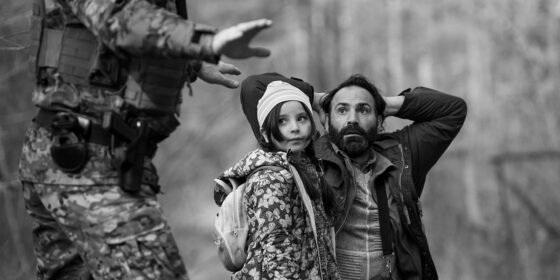TIFF 2023 | Green Border (Agnieszka Holland, Poland/Czech Republic/France/Belgium) — Centrepiece

By Jordan Cronk
Polish director Agnieszka Holland’s best film in years falls into that most familiar of modern day genres: the migrant drama. Co-written by Holland, Maciej Pisuk, and Gabriela Łazarkiewicz-Sieczko (and directed in collaboration with Kamila Tarabura and Katarzyna Warzecha), Green Border is set on the threshold of Poland and Belarus, where, beginning in 2021, thousands of African and Middle Eastern refugees were seemingly offered open passage to reach Europe. In reality, Belarusian dictator Alyaksandr Lukashenka was attempting to heighten geopolitical tensions in the region to provoke the EU. Told in multiple chapters and from differing perspectives, the film follows a number of characters on both sides of the situation—including a Syrian family, a widowed psychiatrist (Maja Ostaszewska), a pair of activist sisters (Monika Frajczyk and Jasmina Polak), and a border guard (Tomasz Włosok)—whose lives intertwine against the backdrop of this nebulous war zone.
Shooting in black and white with cinematography by Tomasz Naumiuk, Holland paints a bleak but effective picture of the ongoing crisis, with moments of care and compassion overrun by scenes of violence and inhumanity. Across 152 minutes, she allows each story thread ample time to develop and reveal its relationship to the family at the center of the film, whose attempts to reach safe haven in Sweden are continually thwarted and restarted, turning the eponymous exclusion zone into a kind of purgatory from which they can’t escape. But for all the harrowing encounters and near-death depictions, the film, impressive to a fault, labours to transcend its dramatic trappings, only rarely breaking from its fictionalized framework—as in a late scene where a group of teenage refugees offer video testimonials of their struggles—to speak to the audience at eye-level, rather than at a distance.
Jordan Cronk

